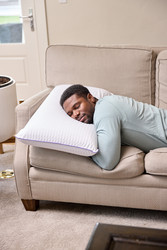7 Tips to Have a Great Thanksgiving Nap
Thanksgiving is just around the corner. While we’re sure the main focus of the holiday is the wonderful company you’ll enjoy and the yummy food you’ll consume, it’s also nice to think about that nap you’ll have when the festivities settle down. But why do we get so sleepy after a Thanksgiving meal? Is turkey really the culprit?
Sleep and What We Eat
Contrary to popular belief, turkey is not the main cause of your sleepiness. The chemical found in turkey, tryptophan, can also be found in many other foods including chicken, fish, cheese, and milk. Tryptophan is just one of the many amino acids competing for your body’s attention when entering the bloodstream. It’s actually believed that the stress of the holiday, increased blood flow for digestion, and the consumption of carbohydrates creates the perfect recipe for an afternoon snooze.
Benefits of Napping
There are a lot of benefits that can be had from napping. Sleeping in short bursts can boost your immune system, improve your mood, increase alertness, and even improve your memory. So how do you have the best nap this Thanksgiving? We’ve listed a few tips below.
Eat Early
Make sure you allow enough time for your body to digest the whole plate of food you’ve consumed. Sleeping is known to slow metabolism and can make it harder to digest food. Waiting an hour or two before taking a nap can help regulate your metabolism.
Save Room for Later
Since eating too much can cause digestive issues, it can also lead to sleep disruptions. Because of this, it’s difficult to receive any restful sleep. You may wake up more irritable than when you first closed your eyes—and nobody wants that, especially your family.
Find a Quiet Place
It’s best to find a quiet room away from sleep disruptions, such as a loud football game or a playful squealing child. You also want to make sure the room is dark, without any sunlight or blue light from electronics. Sunlight received by the brain stunts melatonin, which leaves you feeling more awake.
No Caffeine
If you're planning an afternoon nap, say no to an afternoon cup of coffee. This should be a no-brainer. Caffeine can make a person feel jittery and alert. For some, it can also cause an upset stomach—which is not the ideal situation for a restful snooze. So, lay off the caffeine before your nap for better sleep.
Keep It Short
A 20-minute nap is optimal for rest and rejuvenation. A 30-minute or longer nap can cause the body to go into a deep sleep, which can leave you feeling groggy. If you want a longer nap, make sure you don’t have any plans afterward that require you to be alert or full of energy because you might not feel up to it.
Aim for the Early Afternoon
Try taking a nap before it gets too late in the afternoon. Any later than this can cause some disruptions in your nighttime sleep clock. You want to avoid disruptions to your normal sleep routine because it can get your body out of whack for days (and sometimes weeks) to come. No one wants to lay awake at night, unable to sleep, knowing they have to wake up for work the next morning.
Find Optimal Sleep Products
Try one of our scent-infused pillows to enhance your nap experience. Aromatherapy such as lavender and citrus can promote relaxation and is known to lower anxiety, making your sleep the most calming experience possible after a long and stressful day.
Better Naps Ahead
We’re happy to assist you in getting better sleep around the holidays. Now all you’ve got to do is prep the turkey. Head to the Lucid website to shop for all your sleep needs before the big day.
